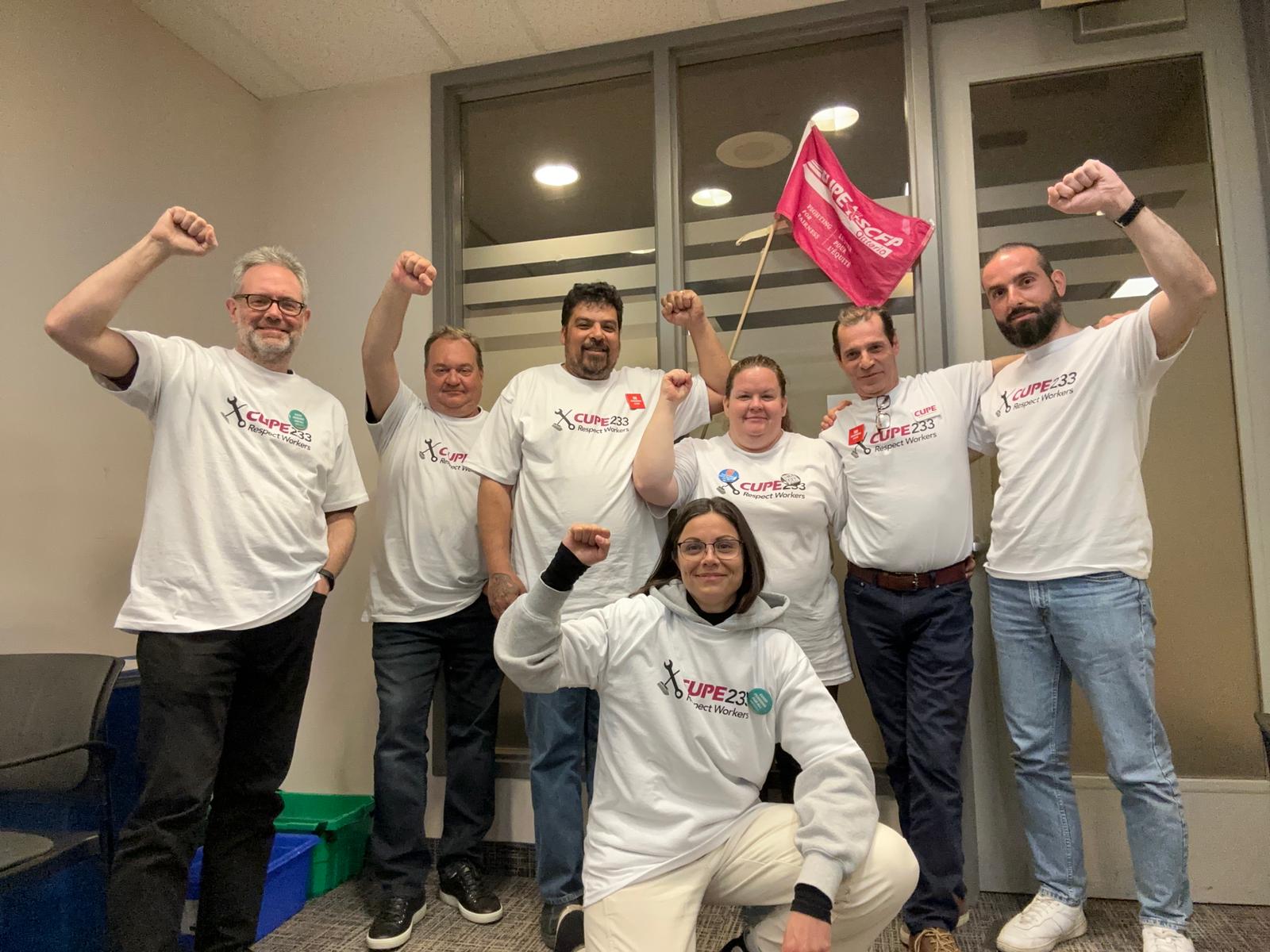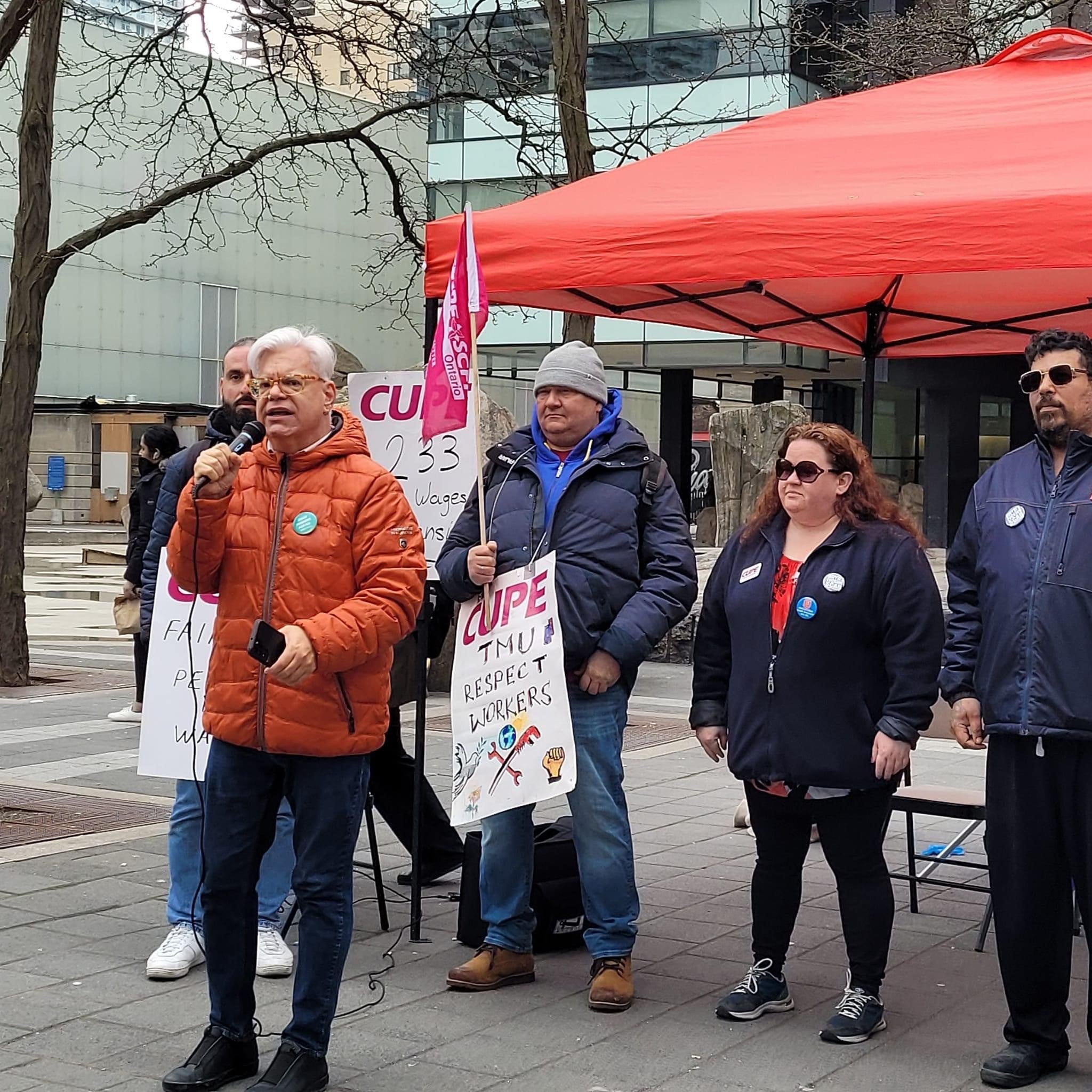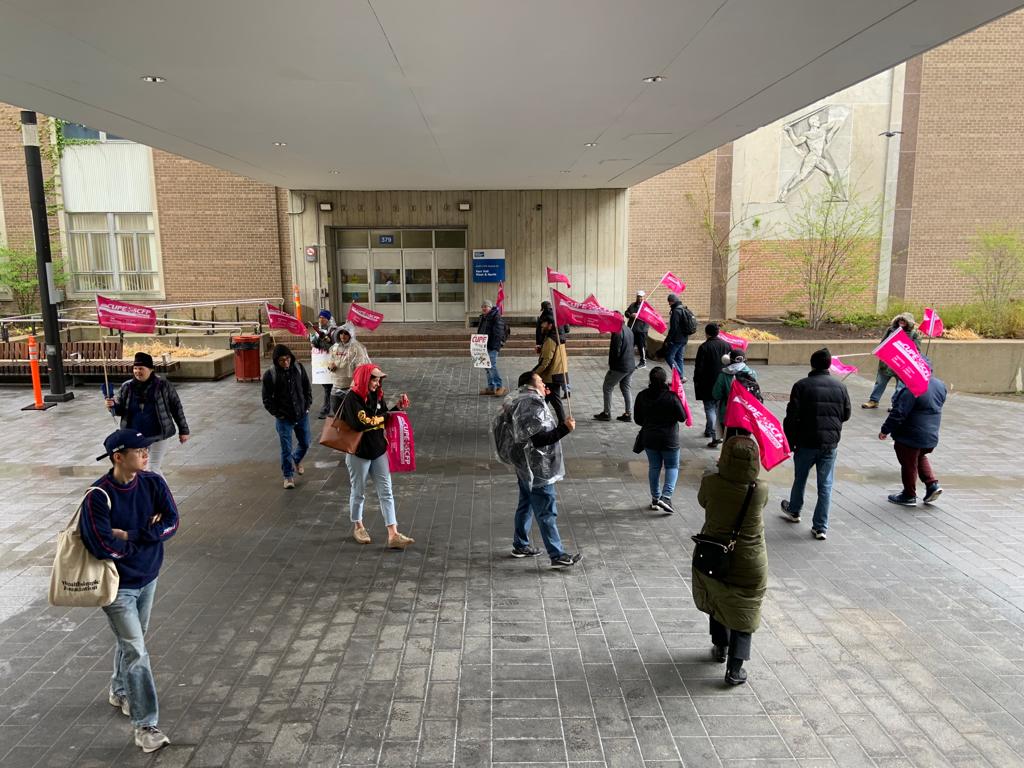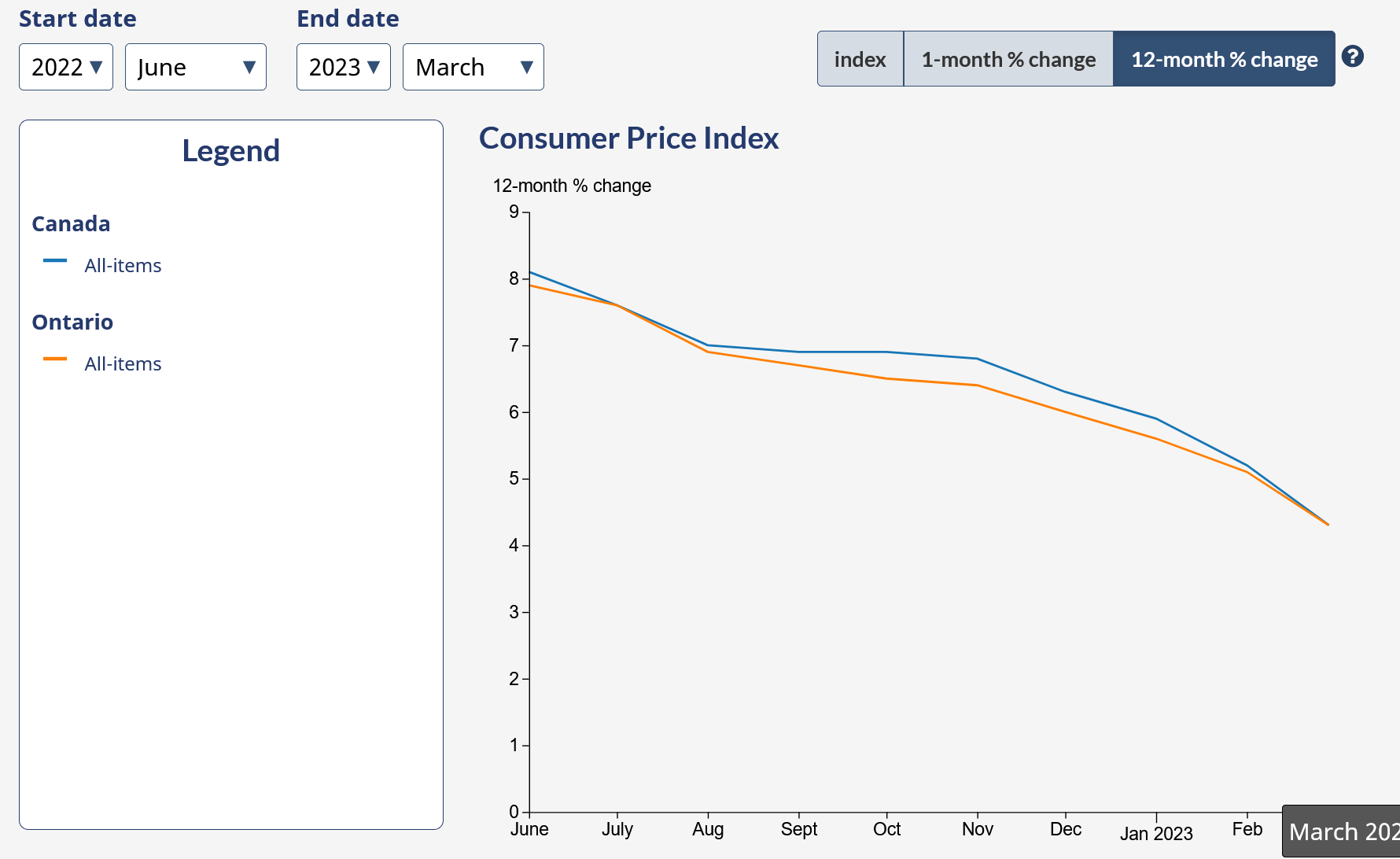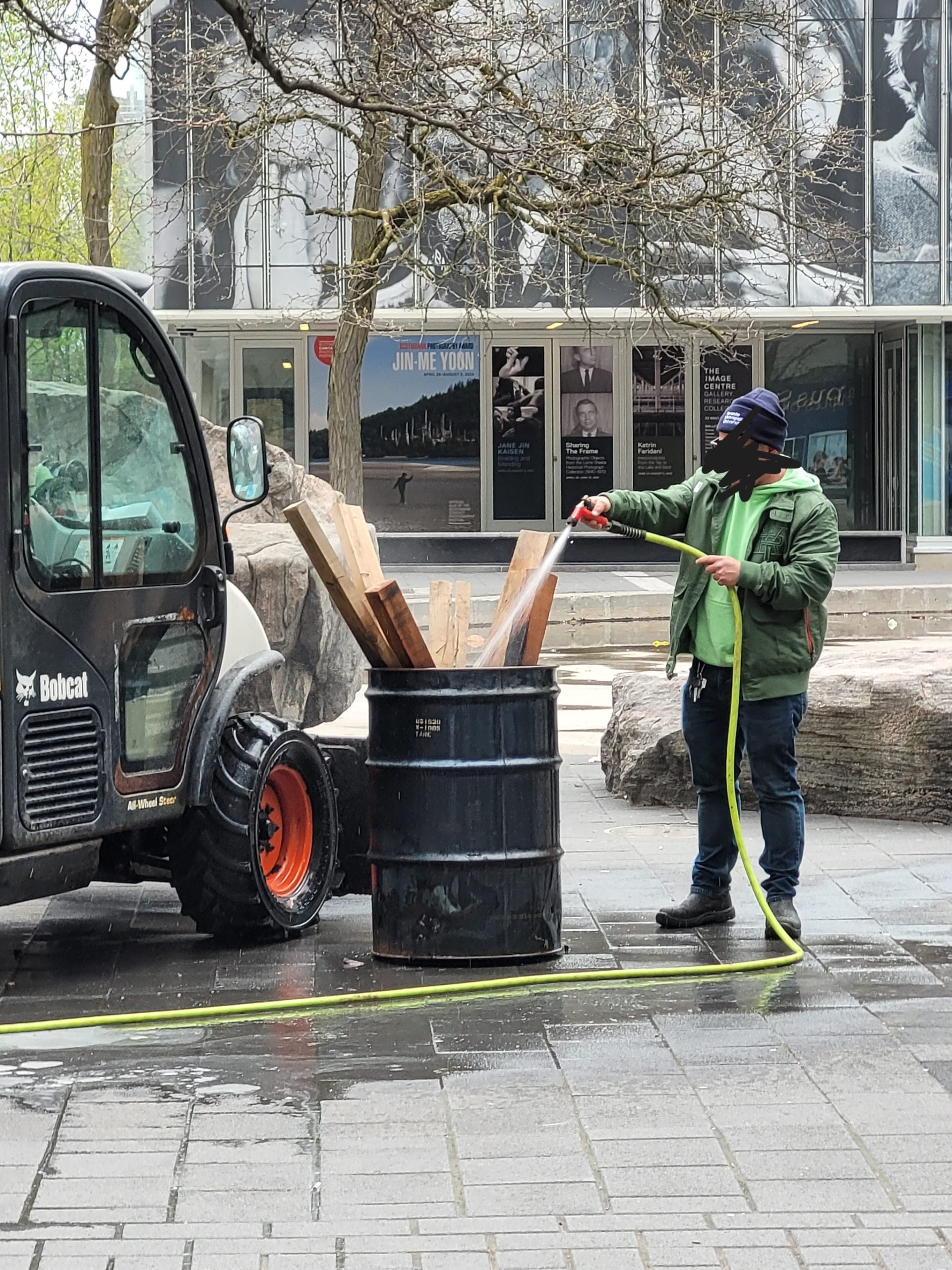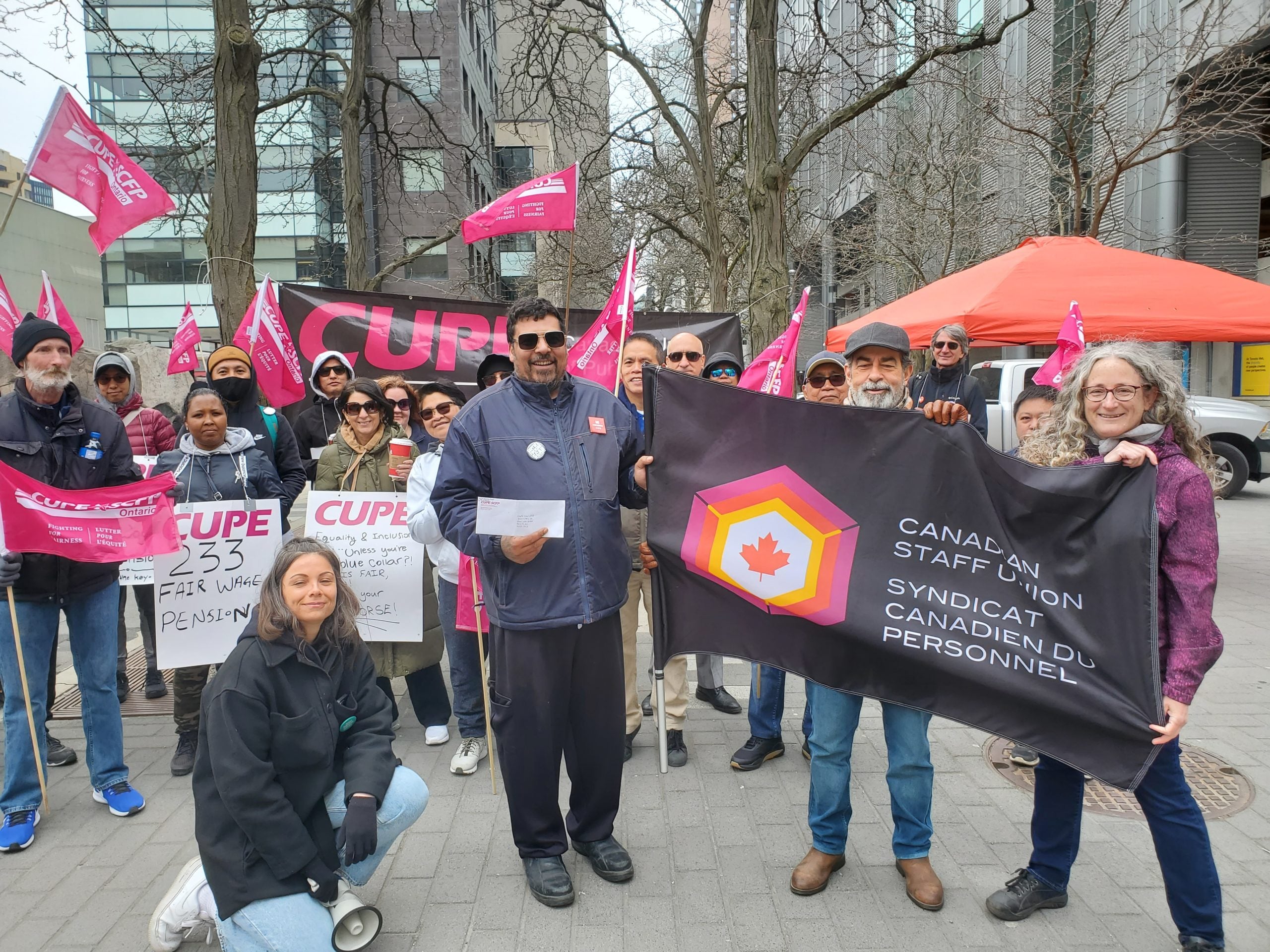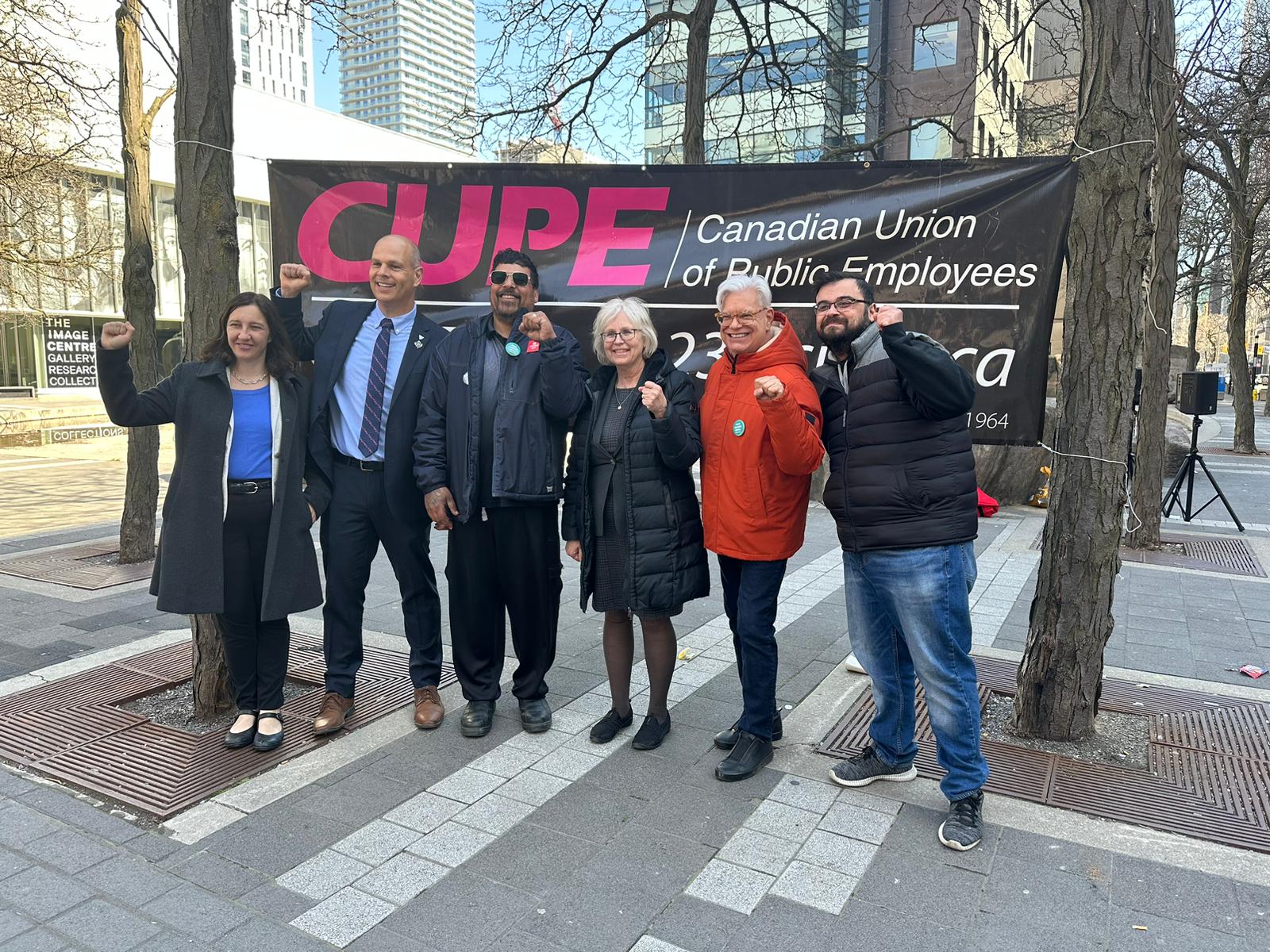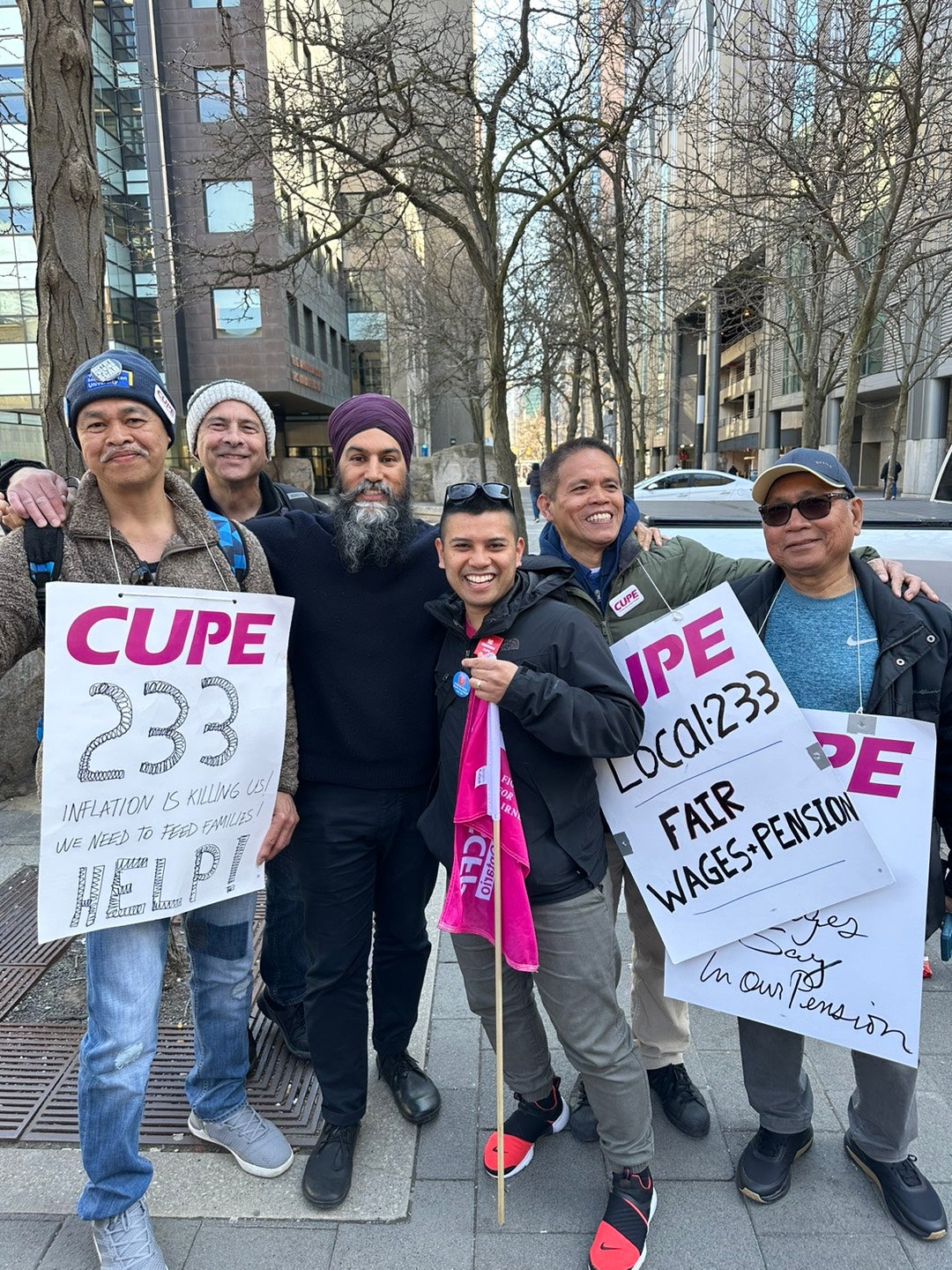Strike Update: May 3, 2023
Update from the picket line
Great chanting today during the Law School luncheon event with the Associate Deputy Minister of Canadian Heritage, Mala Khanna. Keep it up!
What do we want? Fair pensions!
What do we want? Fair wages!
When do we want it? Now!
We deserve a fair wage increase
Inflation is eroding our purchasing power, and all the interest rate increases are making life even less affordable for workers.
Anything less than inflationary is a wage cut.
The price of groceries has also increased. And, we know CUPE 233 members have felt the loss in their purchasing power at the grocery store because you told us in your responses to our bargaining survey. In fact, of those that completed our survey, 86% reported “food” as an area you have noticed unusually high increases in costs over the previous year that are becoming a financial burden for your family.
These are just some of the reasons why we deserve a fair wage increase.
Strike Update: May 2, 2023
Update from the picket line
Our burn barrels did not last very long today on the picket line. 🙁
Bargaining Update: We have been in touch with the employer today. We further discussed ways to get the parties back to the table. Both parties are hopeful we will be back at the table soon. Please stay tuned for future updates.
Update on strike pay top-up
The Strike Committee has reviewed the local strike fund finances, and we are able to provide members with an additional $100 top-up on our strike pay for a total of $700/week for 20 hours (4 hours per day) of picketing, starting on the pay period covering the week of April 24th. This is with many thanks to all of those that have donated to our local’s strike fund so far.
OFL Solidarity Rally for CUPE 233
Strike Update: May 1, 2023 – May Day!
Update from the picket line
May Day is International Workers’ Day! Read CUPE’s statement for May Day 2023 here: https://cupe.ca/event/may-day-international-workers-day
We received another donation today from CUPE Local 2424, representing administrative, technical, and library workers at Carleton University in the amount of $1,000. This is another CUPE local who went on strike back in 2018 over a similar issue that we are trying to fight for: preventing the employer from making unilateral changes to our pension plan.
CUPE launches “full donor boycott” against Toronto Metropolitan University
Read our latest press release here calling for a full donor boycott against our employer until the strike is resolved: https://cupe.ca/cupe-launches-full-donor-boycott-against-toronto-metropolitan-university
University response to our letter to President Lachemi with health and safety concerns on campus
Please check your emails to see the response we received to our health and safety letter.
The employer has received our notice, so now we are prepared to start launching complaints and investigations should we have any concerns about campus safety.
Please continue to report on health and safety concerns/violations you may see on campus on the grounds or inside buildings (via window), especially of redeployed staff performing work of our bargaining unit. Please make sure to take a picture.
Strike Update: April 28, 2023 and Notice of Special Membership Meeting
National Day of Mourning
April 28th is the National Day of Mourning. Workers in Canada continue to be killed at an unacceptable rate. The most recent statistic shows roughly 1,000 workers are killed on the job each year.
This year, we remember the following CUPE members who died because of work in 2022:
- Sherri Anne D’Amour, CUPE 5167, Ontario
- Michael Boulanger, CUPE 4705, Ontario
- Wilmer Gonzalez, CUPE 2740, Saskatchewan
- Gérald Gauthier, CUPE 375, Québec
Mourn the dead, fight like hell for the living.
Update from the picket line
We received another donation today from the Canadian Staff Union (CSU), the Union representing CUPE National Staff in the amount of $1,500.
Notice: Special Membership Meeting
When: Sunday, April 30, 2023
Time: 2:00pm to 3:00pm
Location: Zoom
Agenda:
- Roll call of officers
- Reading of equality statement
- Updates and discussion:
- Bargaining update
- Strike update
- Next steps
Zoom link will be sent to members prior to the start of the meeting.
Letter to UA787 members
To members of UA Local 787,
You have the right not to cross this picket line. Your collective agreement gives you the right to make the honorable decision to respect the picket line established by CUPE local 233. We encourage you to use your right to refuse to cross this picket line – and to respect members’ of CUPE local 233 in their fight for better wages and pension protections.
Solidarity amongst workers, including respecting each others’ picket lines, is powerful. It is necessary for workers to stand together for any of us to have the strength to win gains for workers. Victories for one local set the bar higher for all locals – and losses at any bargaining table make things more difficult for workers to win elsewhere.
You have full protection against reprisals for exercising your right to not cross this picket line. We ask, in the interests of our members and of all workers fighting for better wages and working conditions, that you choose not to cross.
ARTICLE 24: PICKET LINES
24:01 Employees may honour a picket line established by any Trade Union or its members in support of a lawful strike at a project where an Employer is engaged. Such action shall not constitute an unlawful strike within the provisions of this Collective Agreement and the Employer shall not institute or commence any applications, actions or proceedings of any nature whatsoever under the Ontario Labour Relations Act, this Collective Agreement or otherwise against the Union or any of its officers, officials, servants, Employers, agents or members in connection with any such action.
Strike Update: April 27, 2023
Update from the picket line
- Donations:
- CUPE Local 1750 – $2,250
- Ontario Federation of Labour (OFL) – $5,000
- CUPE Local 4948 – $500
- Our letter to the university president re: health and safety concerns on campus was sent to the Office of the President this morning.
- Our letter to the BoG re: additional information about the pension dispute was sent out and circulated earlier with the membership this afternoon.
- Bargaining Update: The employer still does not have another mandate than what was last offered to us on April 12. But, the parties do have an open line of communication. We will notify the membership should there be any movement from the employer to negotiate a fair deal.
Pictures from today’s rally
Letter to TMU Board of Governors re: additional information about the pension dispute
Dear Board of Governors,
We are taking the unusual step of writing to you directly because of the urgency of the current situation and our growing conviction that you have not been provided with a complete picture of the sequence of events that has resulted in the University’s first full scale work stoppage in decades.
As you know, CUPE Local 233 represents about 110 TMU employees working as custodians, maintenance and trades workers. We are the ones that work to maintain and clean the buildings, systems, and grounds of our campus. Since the start of the Covid-19 pandemic, most of our members have continued working on site, keeping the campus operating and safe until the return of students and other staff. In fact, CUPE 233 members were recipients of the 2022 “President’s Blue and Gold Award of Excellence” as the University’s pandemic essential on-campus workers team. We are proud of the work that we do and the role we play in securing the best learning environment for TMU students.
We are now well into a second week on strike picket lines when we want to be back at work. The breakdown in our efforts to negotiate a new collective agreement was a serious disappointment and we are deeply concerned at what we view as an intransigent approach to negotiation on the part of University management.
We believe a real wage increase and the recognition of our basic right to negotiate the terms of our pension plan – on the same basis as our faculty colleagues – is entirely reasonable, particularly in a context where University decisions have resulted in our members paying higher pension contributions than our faculty colleagues for the same benefits. It is deeply disturbing to our members, particularly following their loyalty and work during the pandemic, that TMU management has taken the official position that our members deserve fewer bargaining rights than faculty members and a second-tier pension.
As we hope you have heard, the issue of the pension plan is one of the two key outstanding issues in dispute – along with wages. However, we are concerned that you may not have been provided a complete picture of the pension problem.
We have had an opportunity to review the briefing materials on pensions provided to the Board on September 28, 2022 and we believe that the material provided did not give accurate and complete information about the issue, particularly in light of collective bargaining with CUPE 233, OPSEU 596, and TFA. We would like to briefly explain why we believe this.
In 2020 Board Approves Contribution Rate Increase Despite Lack of Negotiated Terms
As you know, in September 2020, TMU management recommended to you the filing of a new actuarial valuation (dated December 31, 2019) and the implementation of a 0.8% member contribution rate increase (BOG binder, p. 3) required by that valuation when filed with the provincial pension regulator. That recommendation was presented in a manner that made the member contribution increase sound like it was a legally required and automatic change. It was not.
In the supplementary actuarial slide deck prepared by Willis Towers Watson (WTW) for the Board, readers could see that in fact “Ryerson management is recommending an increase in Ryerson/employee contribution rates effective January 1, 2021” (emphasis added).
This increase applied to all members – including the members of the faculty association, TFA, whose collective agreement stipulates a fixed contribution rate that can only be modified through negotiation. To the best of our knowledge, no reporting of this collective agreement provision, or its potential consequences, was provided to the Board of Governors.
Even more significantly, no warning was provided to the Board of the threatened potential dispute or litigation or other labour relations disruption that might result from the Board’s approval of that contribution rate increase in 2020. There was also no mention made in this document of the fact that all three of the main unions representing pension plan members were strongly opposed to this unilateral increase of member contribution rates. It was a highly contentious and costly action by management.
As you now know, the Board of Governors approval of that management recommendation in 2020 led directly to the filing of a legal grievance against the Administration by TFA. Rather than attempt to negotiate a resolve as it had done previously in similar situations, management decided to fight the faculty grievance, and allocated an undisclosed but surely substantial amount of funding for associated lawyers’ fees, related billings, and staff time. Following months of hearings, legal submissions, testimony, and deliberations, arbitrator Matthew Wilson found that the Board of Governors had violated the TFA collective agreement. In his April 26, 2022 decision, arbitrator Wilson ordered the University to address this violation.
Same Issue Leads to Work Current Stoppage
Yet, this was not the end of the problem. Subsequent to the release of this arbitration award, the Board of Governors received a further set of recommendations from management that led directly to the current work stoppage.
On September 28, 2022, the Board of Governors received a recommendation from management to approve another actuarial valuation report applying as at March 31, 2022.
In the material that management provided to the Board, management reported the good news that “no additional contributions would be required” if the draft valuation were filed with the regulator, and that the plan was in a surplus on both the going concern and solvency bases. The Board of Governors accepted the management recommendation and the valuation was filed.
What the Board was not informed was that this new valuation showed not only that no contribution increases were required, but that the plan’s actuarial cost had fallen significantly.
Where the prior valuation had reported that the normal cost contribution obligation had increased from 16.84% up to 17.60%, the new normal cost obligation had fallen back to just 16.22%. At this lower level, it would have been possible to return the contribution rates to where they had been in 2020 – 16.84% – and still provide a healthy margin (or additional contribution) to the plan.
In fact, such a rate reduction could have restored the previous uniformity of contribution rates across all unions and employee groups and even re-established an equal contribution level between the employer and all plan members – in keeping with management’s stated preference. This is why we believe our current proposal on the table to resolve this pension dispute is very reasonable and should be no issue for the university to agree to so we can bring an end to this strike and return to work.
We have no idea why this was not considered, and even more seriously, why this option does not appear to have been shared with the Board of Governors. This is all the more concerning in light of the faculty association’s grievance and the arbitrator’s finding against the Administration.
Even in the event that management had preferred to maintain the higher level of contributions (despite the drop in actual required cost), it was clearly an option for the Administration to restore the prior contribution rates for all plan members and bring the pension cost issue into collective bargaining for all of the unions.
Instead, the Administration recommended to the Board that you approve a plan amendment that reduced contribution rates of faculty members only – leaving lower paid workers at TMU contributing to the plan at a higher rate than faculty, and moreover, one that was clearly unnecessary. We are certain that you can understand why this decision – and the imposition of a clearly inequitable two-tier pension structure on our members – was simply unacceptable to us.
Rapidly Growing Excess Funding
Finally, you may have heard that a further aspect of the dispute over pension matters is about a credit account established in the last three valuation reports known as the “Prior Year’s Credit Balance” or PYCB.
This controversial and rarely used mechanism allows employers in single employer pension plans who hold the sole liability for normal cost increases to accumulate and recognize voluntary “over-contributions”, that is, amounts contributed that are above the legal minimums, as a “credit” to the employer’s account. That credit can then be utilized to fund employer obligations. That is, management is creating a credit account using the higher contributions of the lowest paid workers at the University, which it uses for its own benefit.
In case of any doubt on this point, the guidance documents published by the Financial Services Regulatory Authority (FSRA) make it clear that “a PYCB may be applied to reduce certain employer contributions or payments”. A PYCB can even be used to pay for employer obligations to fund deficiency payments. Given the new, higher level of “overcontribution” flowing in to the plan, the roughly $8 million in PYCB balance is now likely to be well over $10 million and growing more quickly than ever.
We are sure you will agree that it is reasonable for CUPE – and other trade unions – to want to ensure that the monies contributed to our pension plan are used for the benefit of our members. This is also an issue in the current dispute that we believe should be easily resolved.
Finally, it is important to underline that CUPE’s pension bargaining proposals do not seek pension benefit improvements that would increase University costs. The valuation now filed has established cost certainty for the Administration until at least April 2025. The pension plan now holds a comfortable surplus and, as indicated above, the University’s actuarial cost has declined significantly. In the general market, long term interest rate increases have recently led many pension plans to increase their discount rates (reflecting improved projections of long-term rates of return) for the first time in over 20 years.
In this light, we are very disappointed to find ourselves on strike picket lines over an issue that could have been resolved quickly and at minimal cost. CUPE is simply seeking to ensure that along with a reasonable wage increase, our members can exercise the same right to negotiate over our pensions as our faculty colleagues. CUPE Locals at many other universities have this right and we see no reason that TMU is unwilling to recognize it for our members.
We ask that you take whatever steps may be in your power to ensure that Administration negotiators are given a new mandate to negotiate a resolve to the ongoing strike.
Sincerely,
Jason Vigilante
On behalf of the CUPE Local 233 Executive Board
CC: Simon Archer (Goldblatt Partners)
Jesmen Mendoza (Toronto Metropolitan Faculty Association)
Kella Loschiavo (OPSEU 596)
Mark Hancock (President, CUPE National)
Jenny O’Donnell (Chief Human Resources Officer, Toronto Metropolitan University)
Joanne McKee (Chief Financial Officer, Toronto Metropolitan University)
Letter to University President re: Health and Safety of Campus Community Members During Strike
Mr. Lachemi,
RE: Health and Safety of Campus Community Members
CUPE Local 233 is writing to affirm TMU is currently engaged in activities that pose health and safety risks on campus. Specifically, management is seeking volunteers or directing untrained staff/faculty to clean and maintain buildings using hazardous products and equipment during CUPE’s legal job action without proper guidelines, equipment, and gear. The actions taken by TMU amount to violations of law and place the campus community at high risk.
Beginning on April 17, CUPE has observed and received first-hand accounts of students and staff/faculty using hazardous cleaning chemicals and equipment used by CUPE bargaining unit members. Neither students nor staff/faculty have received training on the safe use of these chemicals and equipment as required by the Occupational Health and Safety Act (OHSA) and the WHMIS regulation. Further, there is no supervision to ensure that the chemicals and equipment are used in a manner that protects the students and staff or anyone on campus who may be endangered by their misuse.
The OHSA requires a director and every officer of a corporation to take all reasonable care to ensure that the corporation complies with the OHSA and its Regulations.
In particular, the legislation requires an employer to comply with the following:
- Ensuring proper training, education and supervision to protect the health and safety of a worker; 25 (2) (a) OHSA
- Ensuring workers and those who supervise workers must be acquainted with the hazards in the work and the handling, storage, use, and disposal of chemical agents; s. 25 (2) (d) OHSA
- Ensure a worker exposed or likely to be exposed to a hazardous material participates in prescribed (WHMIS) instruction and training; 42 (1) OHSA
- Ensure that a worker who works with or who may be exposed to a hazardous product is informed about all hazard information the employer receives from the supplier concerning the hazardous product and all further hazard information of which the employer is or ought to be aware concerning its use, storage and handling; 6 (1) Reg. 866 (WHMIS)
- Ensure every worker who works with or who may be exposed to a hazardous product in the course of their work is instructed in:
- the contents required on labels and the purpose and significance of the information contained on the labels;
- the contents required on a safety data sheet and the purpose and significance of the information contained on a safety data sheet;
- procedures for the safe use, storage, handling and disposal of a hazardous product;
- procedures for the safe use, storage, handling and disposal of a hazardous product when it is contained or transferred in a pipe, a piping system including valves, a process vessel, or a reaction vessel;
- procedures to be followed when fugitive emissions are present; and
- procedures to be followed in case of an emergency involving a hazardous product; 7 (1) Reg. 866 (WHMIS)
- Ensure hazardous material must not be used, handled or stored at a workplace unless the prescribed requirements concerning worker instruction and training are met; 37 (3) OHSA
- Make available safety data sheets to those who work with hazardous materials and those who may be exposed to hazardous materials; 38 (1) (a) OHSA
NOTE: Worker instruction must be relevant to existing safety training prevention programs and results in the workers being able to use the information to protect their health and safety; s. 7 (2) (3) Reg. 866 (WHMIS).
To our observation and understanding, none of the training required above has been carried out in compliance with existing legislation. Not only is TMU endangering health, safety and life, but they are also exposing themselves to liability.
A violation of the OHSA carries a potential fine of up to $500,000 or up to twelve months imprisonment for a person upon conviction. A corporation could face up to $1,500,000 upon conviction for a violation under the OHSA. A director of a corporation who does not take reasonable care to ensure the OHSA and Regulations are followed could face up to $1,500,000 or up to twelve months imprisonment upon conviction.
Further, we would like to address the potential liability under the Criminal Code of Canada due to unsafe working conditions. Specifically, we would like to draw your attention to section 217.1, which reads:
“217.1 Every one who undertakes, or has the authority, to direct how another person does work or performs a task is under a legal duty to take reasonable steps to prevent bodily harm to that person, or any other person, arising from that work or task.”
The above-noted requirement can apply to both an individual and/or a corporation.
All persons have the right to a healthy and safe working environment. Should management continue endangering health and safety and showing a reckless disregard for the law, we reserve the right to pursue further action, including but not limited to filing complaints with the Ministry of Labour, Immigration, Training and Skills Development and the Ontario Labour Relations Board.
Regards,
Jason Vigilante, Vice-President, CUPE 233 on behalf of the CUPE Local 233 Executive
CC: Seema Bhat, Executive Assistant, Offices of the President and Chancellor (via email)
Strike Update: April 26, 2023
Reminder: What to do if you see a contractor or staff/students performing our work?
For custodial/grounds:
- Take a picture, especially if they do not have the proper PPE while operating our carts.
- Email to cupe233strike@gmail.com.
- Find a member of the Local Executive and/or your CUPE National Representative on the picket line and notify them immediately.
For trades:
- Take a picture
- Ask: who called them?
- Ask: what type of work are they here to do/perform?
- Find a member of the Local Executive and/or your CUPE National Representative on the picket line and notify them immediately.
